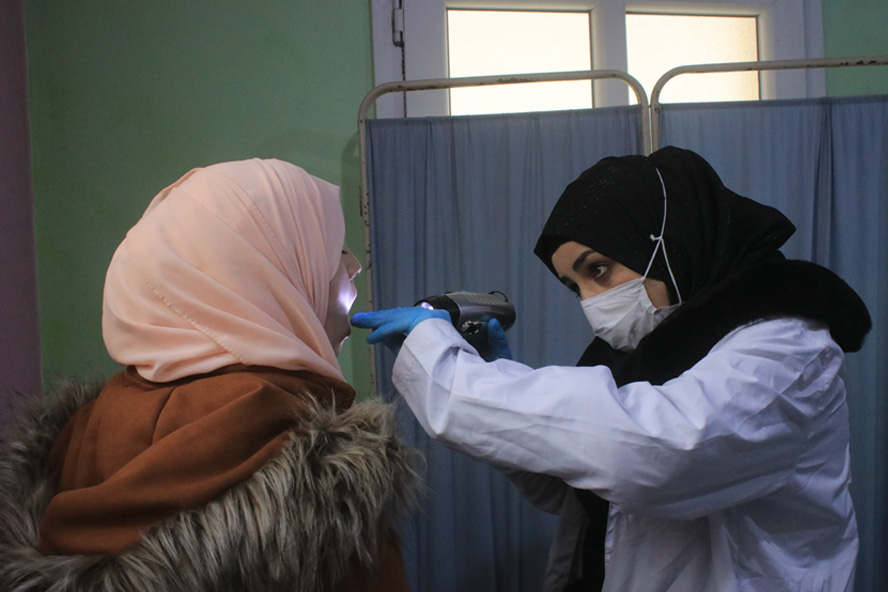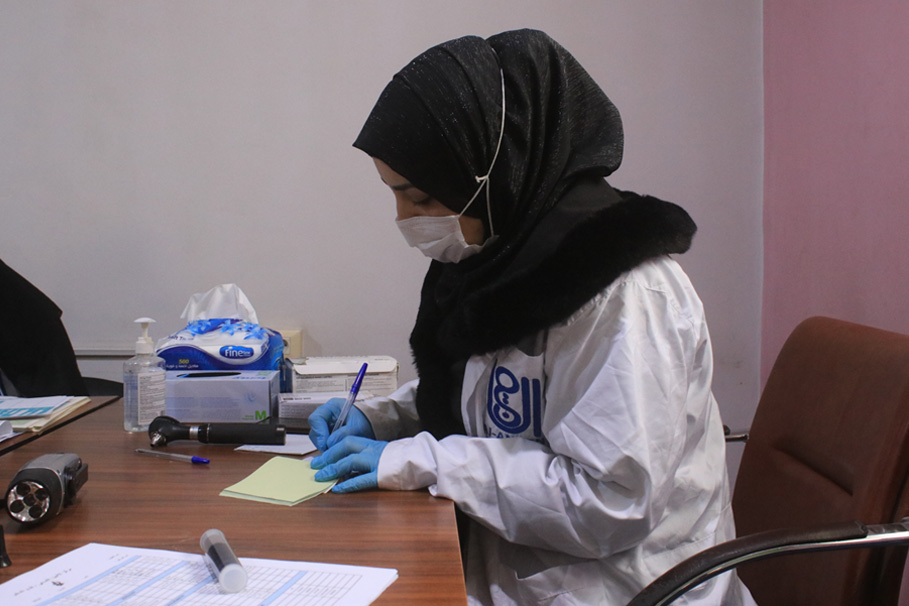 Dr Aziza Al-Naasan attends to a patient. Photo: WHO25 February 2025, Aleppo, Syrian Arab Rebublic – As an internal medicine doctor at Al-Ameen Medical Centre in Al-Bab, northern Aleppo, Dr Aziza Al-Naasan knows that every day is a battle to heal. She treats a steady stream of patients, many suffering from chronic conditions such as asthma, diabetes, heart disease and high blood pressure.
Dr Aziza Al-Naasan attends to a patient. Photo: WHO25 February 2025, Aleppo, Syrian Arab Rebublic – As an internal medicine doctor at Al-Ameen Medical Centre in Al-Bab, northern Aleppo, Dr Aziza Al-Naasan knows that every day is a battle to heal. She treats a steady stream of patients, many suffering from chronic conditions such as asthma, diabetes, heart disease and high blood pressure.
Originally from Idlib, Dr Aziza now lives in Aleppo with her husband and 2 daughters. Like millions across Syria, she witnessed firsthand the devastating toll of conflict on families, communities and the health care system.
“We help patients by providing the right treatment and guiding them on how to take their medication properly,” she says. “We also offer lab tests and diagnose conditions, which greatly improves their health.”
Many of her patients are displaced people who fled their homes due to violence. Syria is home to an estimated 7.4 million internally displaced people, nearly a third of whom live in Idlib and over a fifth in Aleppo. For them, accessible health care is not just about survival today, it is a vital step towards rebuilding their lives.
“We make sure they get the care they need without having to travel far,” says Dr Aziza. “It brings me joy to know that my work helps ease their suffering.”
A health system struggling to cope
Nearly 14 years of conflict severely weakened Syria’s health system. Only 57% of hospitals and 37% of primary health care centres are fully functional and there are widespread shortages of medicines, equipment and trained personnel.
Despite the challenges, hope is emerging. Dr Aziza speaks of a newfound sense of optimism across Syria – a possibility, however fragile, that years of conflict may be nearing an end.
“People have endured unimaginable hardships and what matters now is ensuring they continue to receive health care,” she says. “Even if peace is within reach, rebuilding lives takes time. Without reliable medical care, the suffering will not end.”
She hopes to see her patients – many of whom have lived through profound trauma – return to their homes, rebuild their communities and access health care in stable environments. But without sustained support, facilities like hers struggle to stay open.
Keeping health care running
 Dr Aziza writes a prescription for her patient, ensuring they receive the care they need. Photo: WHOTo keep critical health services operational, WHO, supported by KSrelief, is providing vital assistance across Syria. Over the past 4 months funding from KSrelief has helped sustain more than 50 health facilities in northwest Syria, including hospitals, primary health care centres, dialysis units and tuberculosis treatment centres.
Dr Aziza writes a prescription for her patient, ensuring they receive the care they need. Photo: WHOTo keep critical health services operational, WHO, supported by KSrelief, is providing vital assistance across Syria. Over the past 4 months funding from KSrelief has helped sustain more than 50 health facilities in northwest Syria, including hospitals, primary health care centres, dialysis units and tuberculosis treatment centres.
KSrelief support has ensured Syrians continue to receive medical care. It has covered staff salaries, preventing health workers from having to serve on a voluntary basis, or worse, see their facilities shut down. It has enabled facilities like Al-Bab National Hospital, Hope Hospital for Pediatrics and Maternity, Al-Bab TB Centre, Mare Dialysis Centre and Jarablus primary health care centre provide lifesaving care. Over 154 000 people have benefitted from medical consultations, treatments and surgeries.
“KSrelief’s support has kept our facility running,” says Dr Aziza. “Without it, many health workers would have no choice but to work unpaid. Consistent funding ensures we can provide quality care – not just in emergencies, but to meet long-term health needs.”
A future built on health and stability
Knowing the road to recovery will be long, Dr Aziza is committed to serving those who need her most.
“We want families to return home knowing they will have the health care they need. Health is not just about treating illness, it is about restoring dignity, stability and hope for the future.”
Thanks to partnerships like that of WHO and KSrelief, Syria’s most vulnerable communities will continue to receive the care they need, today and in the years to come.




